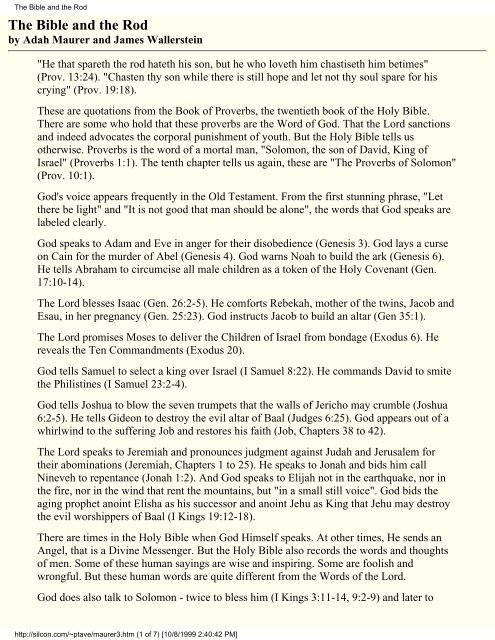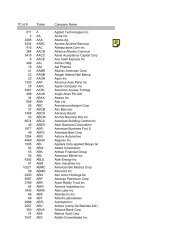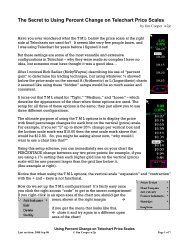spanking - Unauthorized web page
spanking - Unauthorized web page
spanking - Unauthorized web page
You also want an ePaper? Increase the reach of your titles
YUMPU automatically turns print PDFs into web optimized ePapers that Google loves.
The Bible and the Rod<br />
The Bible and the Rod<br />
by Adah Maurer and James Wallerstein<br />
"He that spareth the rod hateth his son, but he who loveth him chastiseth him betimes"<br />
(Prov. 13:24). "Chasten thy son while there is still hope and let not thy soul spare for his<br />
crying" (Prov. 19:18).<br />
These are quotations from the Book of Proverbs, the twentieth book of the Holy Bible.<br />
There are some who hold that these proverbs are the Word of God. That the Lord sanctions<br />
and indeed advocates the corporal punishment of youth. But the Holy Bible tells us<br />
otherwise. Proverbs is the word of a mortal man, "Solomon, the son of David, King of<br />
Israel" (Proverbs 1:1). The tenth chapter tells us again, these are "The Proverbs of Solomon"<br />
(Prov. 10:1).<br />
God's voice appears frequently in the Old Testament. From the first stunning phrase, "Let<br />
there be light" and "It is not good that man should be alone", the words that God speaks are<br />
labeled clearly.<br />
God speaks to Adam and Eve in anger for their disobedience (Genesis 3). God lays a curse<br />
on Cain for the murder of Abel (Genesis 4). God warns Noah to build the ark (Genesis 6).<br />
He tells Abraham to circumcise all male children as a token of the Holy Covenant (Gen.<br />
17:10-14).<br />
The Lord blesses Isaac (Gen. 26:2-5). He comforts Rebekah, mother of the twins, Jacob and<br />
Esau, in her pregnancy (Gen. 25:23). God instructs Jacob to build an altar (Gen 35:1).<br />
The Lord promises Moses to deliver the Children of Israel from bondage (Exodus 6). He<br />
reveals the Ten Commandments (Exodus 20).<br />
God tells Samuel to select a king over Israel (I Samuel 8:22). He commands David to smite<br />
the Philistines (I Samuel 23:2-4).<br />
God tells Joshua to blow the seven trumpets that the walls of Jericho may crumble (Joshua<br />
6:2-5). He tells Gideon to destroy the evil altar of Baal (Judges 6:25). God appears out of a<br />
whirlwind to the suffering Job and restores his faith (Job, Chapters 38 to 42).<br />
The Lord speaks to Jeremiah and pronounces judgment against Judah and Jerusalem for<br />
their abominations (Jeremiah, Chapters 1 to 25). He speaks to Jonah and bids him call<br />
Nineveh to repentance (Jonah 1:2). And God speaks to Elijah not in the earthquake, nor in<br />
the fire, nor in the wind that rent the mountains, but "in a small still voice". God bids the<br />
aging prophet anoint Elisha as his successor and anoint Jehu as King that Jehu may destroy<br />
the evil worshippers of Baal (I Kings 19:12-18).<br />
There are times in the Holy Bible when God Himself speaks. At other times, He sends an<br />
Angel, that is a Divine Messenger. But the Holy Bible also records the words and thoughts<br />
of men. Some of these human sayings are wise and inspiring. Some are foolish and<br />
wrongful. But these human words are quite different from the Words of the Lord.<br />
God does also talk to Solomon - twice to bless him (I Kings 3:11-14, 9:2-9) and later to<br />
http://silcon.com/~ptave/maurer3.htm (1 of 7) [10/8/1999 2:40:42 PM]






